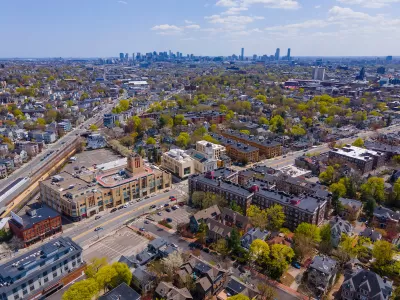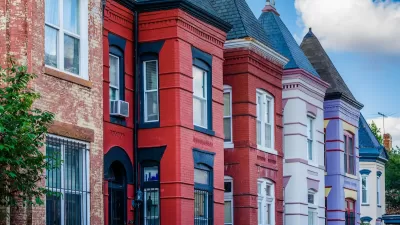A controversial policy is helping create more affordable housing units in the Massachusetts city, but fears of overwhelming density are likely unfounded.

An article by Laurel M. Shugart and Olivia W. Zheng in The Harvard Crimson explains the Affordable Housing Overlay, a policy that aims to increase affordable housing in Cambridge by waiving certain height limits and zoning restrictions for affordable housing developments.
As the article points out, “Though the specific height limits for AHO projects vary across the city, in general, they are allowed to exceed normal height limits by between five and 85 feet. The AHO also allows for projects that are twice as dense than normal developments or more.” AHO projects are also not subject to Planning Board approval, but must still undergo a design consultation process.
Amendments to the AHO passed by the Cambridge City Council last year expand height limits to 12 stories in the densest parts of the city and give developers a more flexible unit size.
According to the article, more than 700 affordable rental units have been proposed under the AHO. However, even its supporters acknowledge that, for better of worse, the policy won’t change the city overnight, and will make only a small dent in the state’s housing crisis.
FULL STORY: Cambridge’s Landmark Affordable Housing Policy, Explained

Maui's Vacation Rental Debate Turns Ugly
Verbal attacks, misinformation campaigns and fistfights plague a high-stakes debate to convert thousands of vacation rentals into long-term housing.

Planetizen Federal Action Tracker
A weekly monitor of how Trump’s orders and actions are impacting planners and planning in America.

In Urban Planning, AI Prompting Could be the New Design Thinking
Creativity has long been key to great urban design. What if we see AI as our new creative partner?

Florida Seniors Face Rising Homelessness Risk
High housing costs are pushing more seniors, many of them on a fixed income, into homelessness.

Massachusetts Budget Helps Close MBTA Budget Gap
The budget signed by Gov. Maura Healey includes $470 million in MBTA funding for the next fiscal year.

Milwaukee Launches Vision Zero Plan
Seven years after the city signed its Complete Streets Policy, the city is doubling down on its efforts to eliminate traffic deaths.
Urban Design for Planners 1: Software Tools
This six-course series explores essential urban design concepts using open source software and equips planners with the tools they need to participate fully in the urban design process.
Planning for Universal Design
Learn the tools for implementing Universal Design in planning regulations.
Gallatin County Department of Planning & Community Development
Heyer Gruel & Associates PA
JM Goldson LLC
City of Camden Redevelopment Agency
City of Astoria
Transportation Research & Education Center (TREC) at Portland State University
Jefferson Parish Government
Camden Redevelopment Agency
City of Claremont





























